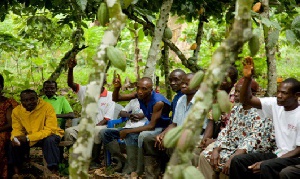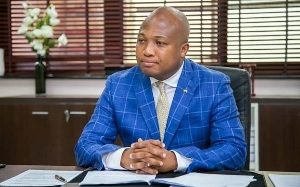The Governance Issues Forum Network (GIFNeT), a subsidiary of the Institute for Democratic Governance (IDEG), has held a day’s multi-stakeholder forum at Effiduase in the Sekyere East District, to assess and address barriers to youth involvement in cocoa production.
This was part of a project being implemented by IDEG in collaboration with the Mondelez International Cocoa Life Programme to ensure sustainability, high production levels and farmers’ returns to help motivate and attract the young people into the production of the cash crop.
GIFNet, established in the various selected cocoa growing communities in the districts, is a framework for promoting participatory bottom-up democracy in Ghana.
It is also empowering citizens especially the youth, women and smallholder farmers to participate in public policy decisions at the local governance level.
Mr. Ewald Quaye Garr, Acting Programme Lead for Civic Empowerment for Community Action (CECA), IDEG, expressed worry that the youth were not getting involved in cocoa farming in the cocoa growing communities but migrating to the urban centres or abroad to look for fortunes which were just not there.
Alluding to a recent research by the Ghana Cocoa Board (COCOBOD), which put the average age of the cocoa farmer in Ghana at 55, he said, the worrying trend of non-youth involvement in the sector, was undermining the sustainability of cocoa production-hitherto the mainstay of the economy.
The forum and the entire project, sought to also explore opportunities within the cocoa sector to improve the livelihood and well-being of the youth in these cocoa growing areas, to enable them to form a critical mass to replace the ageing farmers.
It brought together chiefs and elders, local government officials and assembly members, youth groups, farmers and community members.
The forum offered participants the opportunity to discuss role of the communities in using education to empower and transform the lives of the youth in the cocoa growing communities.
Mr. Garr said it was ironical that in spite of the importance of cocoa to national development, cocoa growing communities were among the poorest communities, with very little or no basic social and economic infrastructure.
He therefore urged the government to prioritize infrastructure development in those areas to improve and sustain cocoa production, ensure the implementation of livelihood projects and programmes for the people, especially the youth there.
He gave high marks to the District Assembly for improvement in the road network and encouraged the GIFNet and community members to take responsibility for the development of their communities.
Madam Mary Boatemaa Marfo, the District Chief Executive (DCE) applauded the initiative by IDEG and GIFNeT and urged community members to work with the assembly in establishing projects and programmes that would address the livelihood, well-being and sustainable development of the youth in their communities.
Mr. Jonathan Aviisah, the GIFNeT National Faculty Chairman, encouraged the community members to expedite the implementation of actions plans designed to empower the youth both socially and economically, adding that, this was a major sustainable development tool in participatory democracy and local governance.
Mr. Aikins Harvery, GIFNeT District Chairman, said participatory democracy and local governance which provided space for the engagement, well-being and livelihood development of the youth, was the surest and sustainable way to enhance development in the cocoa growing communities.
He called on the government and all stakeholders to respond to the developmental needs of the cocoa growing communities.
Business News of Saturday, 13 October 2018
Source: ghananewsagency.org

















